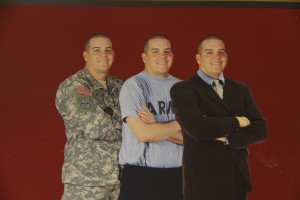
For many of America’s bravest men and women, the joy of coming home from a deployment is sometimes shattered by the harsh reality of injuries, night terrors and post traumatic stress disorder.
Repeat deployments and more than a decade of war have strained America’s military forces. As the war in Afghanistan winds down, many injured soldiers are returning and must find careers in the civilian workforce. Every year for the next five years, about 16,000 soldiers will return to civilian life and will be looking for jobs.
In addition to preparing soldiers for the transition, the U.S. Army’s Warrior Transition Command recently announced a new program that aims at potential employers, to educate them about wounded veterans and dispel stereotypes about hiring the men and women who have been fighting overseas .
According to a Society for Human Resource Management (SHRM) survey, 36 percent of employers feel PTSD and other mental health issues such as Traumatic Brain Injury make it risky to hire veterans.
“PTSD and TBI are treatable conditions which are not unique to the military,” said Brig. Gen. David Bishop, commander of the Warrior Training Command. “Most individuals affected go on to have successful, productive lives.”
In the United States, the most common cause of PTSD is not related to the military; motor vehicle accidents actually account for most of the cases of PTSD.
As the world’s largest human resources organization, SHRM is working with the Warrior Transition Command to help employers understand that not every veteran suffers from PTSD.
“This is an urgent issue. We don’t want a lost generation of veterans,” said Jeff Pon, chief human resources and strategy officer at SHRM.
Staff Sgt. Paul Roberts’ injuries from an improvised bomb in Afghanistan ended his Army career. But the Army offered him resources to turn his military resume into a competitive civilian one.
“I didn’t need a job. I wanted one. People need a sense of purpose or they start to shut down and wither away,” Roberts said.
Veterans are great job candidates because they have leadership experience, negotiating skills and a commitment to the mission, Bishop said. But oftentimes employers don’t understand military jargon to see how these skills transfer into the civilian workforce.
Ret. Staff. Sgt. Jeremy Boutwell’s injuries led to an early retirement from the Marines in 2011.
“I never thought about doing anything but being a Marine. Having to think about that is difficult. Like, what do you do now?” Boutwell said.
Active-duty Marines who are making the transition to civilian life go through a course that includes resume building and mock interviews. Still, it’s the Marine Corps’ emphasis on leadership and mission accomplishment that makes them marketable.
“If you have a guy who knows how to influence people in a positive way and is motivated, he can do anything and he will be successful,” Boutwell said. The key is learning how to convey intangible skills such as leadership to an employer.
“Quantify it. Tell them who you’ve led, where you’ve led them and what you led them to do,” Boutwell said.
Boutwell said some of his friends who’ve had trouble finding a job after the Marines needed to “humble themselves.”
“If you’re trying to find a job to put food on the table, you’ve got to tell yourself you are now entering the workforce with people that have been working a lot longer than you,” he said. “You may not start the job that you want, but you’ve got to start somewhere.”





